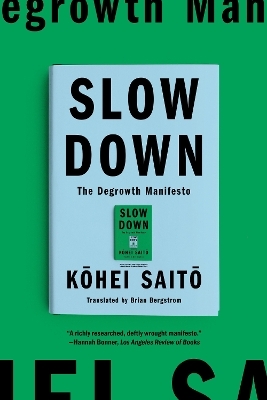
Slow Down
The Degrowth Manifesto
Seiten
2024
Minedition (imprint of Penguin Group (USA) Inc) (Verlag)
978-1-6626-0272-6 (ISBN)
Minedition (imprint of Penguin Group (USA) Inc) (Verlag)
978-1-6626-0272-6 (ISBN)
"[A] well-reasoned and eye-opening treatise. . . . [Kōhei Saitō makes] a provocative and visionary proposal."
—Publishers Weekly, starred review
"A cogently structured anti-capitalist approach to the climate crisis."
—Kirkus Reviews, starred review
Why, in our affluent society, do so many people live in poverty, without access to health care, working multiple jobs and are nevertheless unable to make ends meet, with no future prospects, while the planet is burning?
In his international bestseller, Kōhei Saitō argues that while unfettered capitalism is often blamed for inequality and climate change, subsequent calls for “sustainable growth” and a “Green New Deal” are a dangerous compromise. Capitalism creates artificial scarcity by pursuing profit based on the value of products rather than their usefulness and by putting perpetual growth above all else. It is therefore impossible to reverse climate change in a capitalist society—more: the system that caused the problem in the first place cannot be an integral part of the solution.
Instead, Saitō advocates for degrowth and deceleration, which he conceives as the slowing of economic activity through the democratic reform of labor and production. In practical terms, he argues for:
the end of mass production and mass consumption
decarbonization through shorter working hours
the prioritization of essential labor over corporate profits
By returning to a system of social ownership, he argues, we can restore abundance and focus on those activities that are essential for human life, effectively reversing climate change and saving the planet.
—Publishers Weekly, starred review
"A cogently structured anti-capitalist approach to the climate crisis."
—Kirkus Reviews, starred review
Why, in our affluent society, do so many people live in poverty, without access to health care, working multiple jobs and are nevertheless unable to make ends meet, with no future prospects, while the planet is burning?
In his international bestseller, Kōhei Saitō argues that while unfettered capitalism is often blamed for inequality and climate change, subsequent calls for “sustainable growth” and a “Green New Deal” are a dangerous compromise. Capitalism creates artificial scarcity by pursuing profit based on the value of products rather than their usefulness and by putting perpetual growth above all else. It is therefore impossible to reverse climate change in a capitalist society—more: the system that caused the problem in the first place cannot be an integral part of the solution.
Instead, Saitō advocates for degrowth and deceleration, which he conceives as the slowing of economic activity through the democratic reform of labor and production. In practical terms, he argues for:
the end of mass production and mass consumption
decarbonization through shorter working hours
the prioritization of essential labor over corporate profits
By returning to a system of social ownership, he argues, we can restore abundance and focus on those activities that are essential for human life, effectively reversing climate change and saving the planet.
Kōhei Saitō is an associate professor of philosophy at the University of Tokyo. He received his PhD in philosophy from Humboldt-Universität zu Berlin in 2016. He was awarded the 2018 Deutscher Memorial Prize, the most prestigious academic award for Marxian studies, making Saitō its youngest recipient. In 2020 the Japan Society for the Promotion of Science awarded him the highly prestigious JSPS prize, awarded to the top 25 scholars in the entire country under the age of 45. In 2021, Slow Down received the "Best Asian Books of the Year" prize from the Asia Book Awards.
| Erscheinungsdatum | 08.10.2024 |
|---|---|
| Übersetzer | Brian Bergstrom |
| Sprache | englisch |
| Maße | 152 x 229 mm |
| Gewicht | 318 g |
| Themenwelt | Naturwissenschaften ► Biologie ► Ökologie / Naturschutz |
| Sozialwissenschaften ► Politik / Verwaltung ► Politische Systeme | |
| Sozialwissenschaften ► Politik / Verwaltung ► Politische Theorie | |
| Wirtschaft ► Volkswirtschaftslehre | |
| ISBN-10 | 1-6626-0272-3 / 1662602723 |
| ISBN-13 | 978-1-6626-0272-6 / 9781662602726 |
| Zustand | Neuware |
| Haben Sie eine Frage zum Produkt? |
Mehr entdecken
aus dem Bereich
aus dem Bereich


